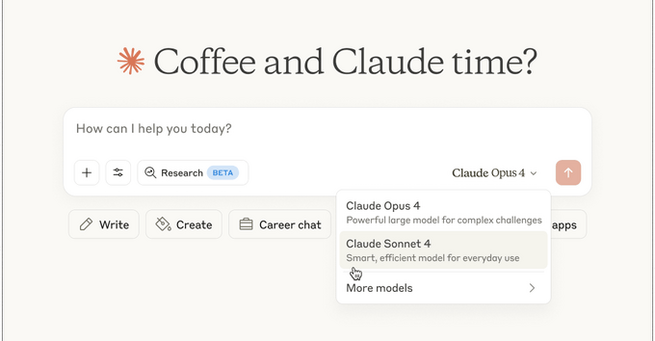
Anthropic Claude 4 AI Models: The Future of Coding and Reasoning in 2025
If you’re searching for the most advanced AI models for coding and complex problem-solving, Anthropic’s Claude 4 series offers groundbreaking improvements in both accuracy and autonomy. Designed to excel in coding tasks and hybrid reasoning, Claude 4 AI models redefine how artificial intelligence assists developers and businesses alike. In 2025, Claude Opus 4 and Claude Sonnet 4 stand out as the latest innovations, pushing the boundaries of AI performance with enhanced coding capabilities, tool usage, and sustained task execution over extended periods.
Claude Opus 4: The Most Powerful AI Model for Coding
Anthropic’s flagship Claude Opus 4 represents a significant leap forward in AI technology. Known as the “best coding model in the world,” Opus 4 can autonomously handle long-running coding and reasoning tasks for several hours, demonstrated by a remarkable seven-hour autonomous test. This model outperforms key competitors such as Google Gemini 2.5 Pro, OpenAI’s o3 reasoning, and GPT-4.1, according to Anthropic’s benchmarks. By efficiently integrating web search and other tool-based functions, Claude Opus 4 maximizes precision and reliability for complex software development and problem-solving workflows.
Claude Sonnet 4: Efficient and Cost-Effective AI for General Tasks
For developers and organizations seeking a budget-friendly yet highly capable AI, Claude Sonnet 4 offers superior coding and reasoning improvements over its predecessor, the 3.7 Sonnet model. Optimized for general-purpose tasks, Sonnet 4 delivers precise responses with 65% fewer shortcuts and logical loopholes, ensuring consistent performance in diverse applications. Both Claude 4 models benefit from enhanced memory management, allowing them to store and recall key information for longer projects—especially when integrated with local file access.
Innovative Features: Thinking Summaries & Extended Reasoning
A standout feature across both Claude 4 models is the new “thinking summaries,” which distill the AI’s complex reasoning into clear, digestible insights. This makes understanding AI decisions easier for users, improving transparency and trust. Additionally, Anthropic’s “extended thinking” beta mode lets users switch between enhanced reasoning and tool usage, optimizing AI performance tailored to specific coding or problem-solving challenges.
Availability and Ecosystem Integration
Claude Opus 4 and Sonnet 4 are accessible through Anthropic’s API, Amazon Bedrock, and Google Cloud’s Vertex AI platform. While paid Claude plans provide full access including the extended thinking feature, free users currently have access to Claude Sonnet 4 only. Anthropic is also advancing its Claude Code command-line tool, now fully released, and committed to delivering more frequent model updates to stay competitive with leaders like OpenAI, Google, and Meta.
Why Claude 4 AI Models Matter for Developers and Enterprises
With AI-driven coding increasingly shaping software development, choosing the right AI assistant can save significant time and reduce errors. Claude 4’s superior coding intelligence, long-run autonomy, and improved reasoning capabilities position it as a high-value tool for developers, startups, and enterprises aiming to leverage AI for innovation.
𝗦𝗲𝗺𝗮𝘀𝗼𝗰𝗶𝗮𝗹 𝗶𝘀 𝘄𝗵𝗲𝗿𝗲 𝗿𝗲𝗮𝗹 𝗽𝗲𝗼𝗽𝗹𝗲 𝗰𝗼𝗻𝗻𝗲𝗰𝘁, 𝗴𝗿𝗼𝘄, 𝗮𝗻𝗱 𝗯𝗲𝗹𝗼𝗻𝗴. We’re more than just a social platform — from jobs and blogs to events and daily chats, we bring people and ideas together in one simple, meaningful space.